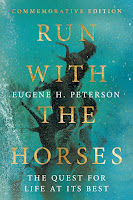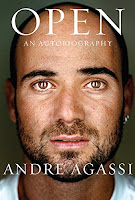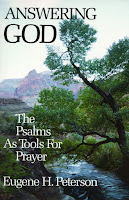Curating this end of the year 'favorite books' list is a labor of love. I don't always enjoy taking the time to review books as I read them, because I often have trouble trying to summarize why I liked a book. However, I am always thankful for my past self for doing so, not just so I can more easily put together this list, but also because I would have a hard time remembering why I was impacted by some of my favorite books otherwise (my memory, sadly, is not quite what I wish it was).
And I also enjoy sharing book recommendations with others, in part because of how much I have benefited from others' lists of recommended books. With that said, see below my favorite books I read in 2022:
1. Run With the Horses by Eugene Peterson (1983)
I didn't want this book to end. Such profound wisdom and a compelling vision of a life of faith. By looking at the life and work of Jeremiah, Peterson reminds us that crowds, celebrity, and success are poor indicators of a life well lived. As he says, "There is little to admire and less to imitate in the people who are prominent in our culture. We have celebrities but not saints. Famous entertainers amuse a nation of bored insomniacs". We're reminded that to be truly human, to be truly alive, is to start with and center ourselves in God, who "knows us and reveals to us the truth of our lives."
Quote: “The larger the crowd, the smaller our lives…If we can’t do it well, we make it larger. We add dollars to our income, rooms to our houses, activities to our schedules, appointments to our calendars. And the quality of life diminishes with each addition. On the other hand, every time that we retrieve a part of our life from the crowd and respond to God’s call to us, we are that much more ourselves, more human. Every time we reject the habits of the crowd and practice the disciplines of faith, we become a little more alive.”
Such a magnificent book and one that I needed to read, especially since I've recently approached midlife. Rolheiser writes about what it looks like to move beyond what he calls Essential Discipleship (the struggle to get our lives together) and move towards Mature Discipleship (the struggle to gives our lives away) and eventually to Radical Discipleship (the struggle to give our deaths away). He's helping to call us further up and further in, to move from activity to contemplation, from doing to being, and ultimately to a deeper, richer intimacy with God.
Rolheiser presented several helpful ideas that will continue to stick with me. He calls us to ponder (transforming and purifying tension/sin) instead of being amazed (mindlessly letting the energy of the crowd flow through). He points out that the lack of silence and solitude in our lives is turning us into people who are "not very deep: not bad, just busy; not immoral, just distracted", and how prayer is the antidote to our restlessness. And finally, he talks about how the mark of maturity is blessing others, delighting in them, giving away some of our lives that others might have more life.
3. Open by Andre Agassi (2009)
I love tennis and I grew up watching Agassi and Sampras, but I was not prepared to love this book as much as I did. I was fascinated by how Agassi's outward persona was often completely misunderstood by others and was much different from the reality of his interior world. It surprised me to learn how much he hated tennis, though it made more sense after learning about the immense pressure his father put on him to succeed. I appreciated his vulnerability about his flaws and the way his pain eventually helped him identify with and seek to alleviate the suffering of others.
Quote: "But fame is a force. It’s unstoppable. You shut your windows to fame and it slides under the door...I marvel at how unexciting it is to be famous, how mundane famous people are. They’re confused, uncertain, insecure, and often hate what they do. It’s something we always hear—like that old adage that money can’t buy happiness—but we never believe it until we see it for ourselves."
4. Invitation to a Journey by Robert Mulholland (1992)
I decided to read this book after hearing that it was John Mark Comer's favorite book on spiritual formation. It did not disappoint. Having read a decent amount in the area of spiritual formation and spiritual disciplines, I was surprised by how much I learned and was helped by Mulholland's somewhat unique take on spiritual formation, namely, that it is a process of being conformed to the image of Christ for the sake of others.
I really appreciated this emphasis ("for the sake of others") as the church, me included, has unfortunately been discipled in the mindset of individualism, thinking our spiritual growth happens mostly between me and Jesus, instead of being worked out in community and for community. As Mulholland says, “There can be no wholeness in the image of Christ which is not incarnate in our relationships with others.”
Ever since reading my first Eugene Peterson book two years ago, and then making the decision to start reading all of his books, he has become a hero of mine. In this biography, Winn Collier added to my fascination and appreciation for how Peterson lived his life. It's a life not without faults, but one that was uniquely gripped by God. He was someone who "longed to be more and fully human, following in the way of Jesus" and who didn't want to settle for minimalist spirituality, but instead asked questions like: "Why not be a saint? Why stop with getting rescued from hell? Why not start exploring heaven?”
Quote: “Eugene had an insatiable desire for the real, the concrete. Past any pretenses. Deeper than the surface. Beyond everything trite or theoretical. Eugene was always searching, always open to more, always on a quest for things that were true and solid. Eugene always had more questions…than answers. This is one reason Eugene was so (frustratingly) reluctant to dispense advice, why he so detested celebrity: he knew these postures of the ego-driven expert were lies and illusions. And this is why Eugene would rather pray with someone than argue theology.”
I knew (or remembered) next to nothing about the battle of Gettysburg before reading this book. I was hooked from the beginning. The narrative nonfiction style made it an engaging read and I appreciated Shaara having each chapter from the perspective of one man and how he rotated between North and South. Shaara seemed to stay away from caricatures and instead provided a nuanced depth to several men on both sides of the fight, evoking empathy for most men involved. I loved the strategy, the acts of bravery, and the camaraderie on display.
Quote: “This is a different kind of army. If you look at history you’ll see men fight for pay, or women, or some other kind of loot. They fight for land, or because a king makes them, or just because they like killing. But we’re here for something new…this hasn't happened much in the history of the world, We’re an army going out to set other men free.” - Joshua Lawrence Chamberlain
Great writing. Great story. It's now one of my favorite Victorian era novels (after Jane Eyre). Eugene Peterson's recommendation of the book (in his fantastic book of book recommendations "Take and Read") is what initially piqued my interest in this work. He says, "The tangle of spiritual intimacy and vocational pride that is the worm in the apple of the Christian life is diagnostically narrated here in an unforgettable story."
Eliott created such interesting characters, by creating great tension in them all, including in my favorite character, Dorothea. At the beginning of Terrence Malick's beautiful film, A Hidden Life, he starts the movie with one of my (now) favorite quotes, coming from this book. I kept wondering when I'd see it and it ended up being in the perfect spot, at the end. It's summarizing both the character and impact of Dorothea on the residents of Middlemarch:
Quote: "Her finely touched spirit had still its fine issues, though they were not widely visible. Her full nature, like that river of which Cyrus broke the strength, spent itself in channels which had no great name on the earth. But the effect of her being on those around her was incalculably diffusive: for the growing good of the world is partly dependent on unhistoric acts; and that things are not so ill with you and me as they might have been, is half owing to the number who lived faithfully a hidden life, and rest in unvisited tombs."
All of Peterson's books I've read so far are either directly or indirectly about prayer. And in Working the Angles, he helpfully articulated the idea that prayer is answering speech, a response to God's initiating first word. It's this idea that he takes up more fully in Answering God, helping us see how the Psalms train us in how to answer.
In this book, Peterson continues to stretch my imagination for what prayer is. He says that we won't find in the Psalms ideas about God or direction for moral conduct, but instead will "find the experience of being human before God exposed and sharpened.” Like most poetry, the Psalms "drag us into the depth of reality itself" and give us language for seeking after the best, what we most long for. And he gives clear, practical advice for how we are to mature in prayer, as most Christians in most times have done: "open our Bibles to the book of Psalms and pray them – sequentially, regularly, faithfully, across a lifetime."
Quote: “Prayer is the developing of speech into maturity…This conversation is both bold and devout – the utterly inferior responding to the utterly superior. In this exchange we become persons. The entire life of faith is dialogue. By means of the Psalms we find our voice in the dialogue. In prayer we do not merely speak our feelings, we speak our answers.”
I love biographies and I love hearing how people I admire are shaped by others, so this book was in my wheelhouse. With each chapter, Yancey outlines the uniqueness of each mentor and how they left an indelible impression on his life. I had not heard of some (Brand, Coles, Koop), knew just a little about others (Gandhi, Donne, Dillard, Buechner, Endo) and had already been positively impacted by the rest (MLK Jr., Chesterton, Tolstoy/Dostoevsky, Nouwen). All chapters were insightful and I appreciated the lessons along the way: love in the face of unjust suffering, the origin and purpose of pleasure, the grace and mystery of life, joy in being with the outcast, and the beauty and terror of nature.
Yancey closes with this recommendation: “Make a list of the people who have shaped your life for the better, and try to figure out why.” I think that's great advice.
A fascinating book about three core lies" dominating our culture right now - 1) We are fragile, 2) Your feelings should always be trusted, 3) Life is a battle between good and evil people - and how those lies are wreaking havoc on our education system, our polities, and the younger generations. The authors do a great job summarizing how these "untruths" are the opposite of wisdom and how they have created a culture of safetyism, where words you disagree with are seen as violence.
Years ago, I was blown away by Haidt's The Righteous Mind, because it did such a good job explaining why people think the way that they do - essentially, our tribal tendencies lead us to use our minds to justify our feelings, desires, decisions - and how that plays out in religion and politics. This book draws on some of this work, but I appreciated how it also draws on the work of Nassim Taleb, with the concept of anti-fragility, and on the psychological framework of CBT (Cognitive Behavioral Therapy). And as a parent, it was good to be reminded of the importance of free unsupervised play for our kids and not sheltering them from all possible risk and pain.
Quote: “Many university students are learning to think in distorted ways, and this increases their likelihood of becoming fragile, anxious, and easily hurt ... what people choose to do in their heads will determine how those real problems affect them.”
Honorable Mentions:
The God of the Garden by Andrew Peterson (2021)
The Brothers K by David James Duncan (2010)
Homegoing by Yaa Gyasi (2016)
The Contemplative Pastor by Eugene Peterson (1989)
How to Inhabit Time by James K.A. Smith (2022)
All Quiet on the Western Front by Erich Remarque (1928)
Where Your Treasure Is by Eugene Peterson (1985)
Sapiens by Yuval Harari (2015)
Reversed Thunder by Eugene Peterson (1988)
The Way of the Heart by Henri Nouwen (1981)
Past Years:









